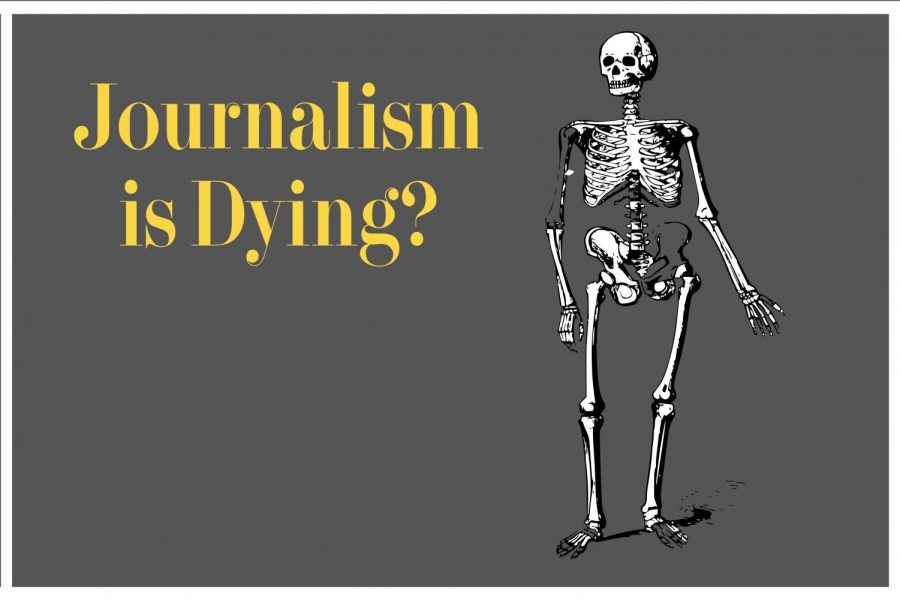Journalism is Dead?
Student Journalist Reviews the Future of News
Student journalist discusses the future of news and shares statistics.
May 7, 2019
“Well, don’t report any fake news.”
Those were the first words a family member said to me when I shared my interest in journalism.
We were driving to school when it happened and as soon as they uttered those words, it became silent and I felt suffocated. There was an underlying message behind their “joke” and it was not laughable. Instead, hearing someone close to me completely discredit the ethical values of journalism came as a big slap in the face.
There are several claims about modern journalism. Media outlets like The Huffington Post and blogs have claimed that overall, journalism is dying. I don’t think this is true.
To put it into perspective, a quick search on Google using the keywords “journalism dying” gets me 38,200 results. Among the many entries, there are two main viewpoints – one being that journalism is dying, and the other, that journalism is not dying, but rather, evolving. I agree with the latter.
It is a fact that the number of paper newspapers has decreased significantly since the turn of the century. According to the Pew Research Center, the circulation of weekly newspapers from 1940 to 2017 has decreased by 25 percent, from 41.1 million to 30.9 million, however, the online viewership of newspapers has increased.
Instead of waking up every morning and fetching the newspaper, people now wake up and use their phones or laptops to stay updated with the changing news. According to the Pew Research Center, there has been a 40 percent increase in the average yearly visits to the top 50 online newspapers between 2014 and 2017. Data that shows that people want to stay informed, and as long as that continues, there is no way that the distribution of news and the creation of stories by journalists will disappear.
Some claim that journalism as a profession will eventually die, as there are big name newspapers like Forbes and the Los Angeles Times already using automated journalism. However, right now they are using artificial intelligence (AI) only for number based articles, e.g. weather, quick sports recaps, financial reports. Besides, if newspapers considered removing journalists for AI software to write stories, it would ruin the human aspect of and would become bland and mundane. There would be no in-depth reports, thus eliminating the enjoyment of reading articles.
The family member who told me to not report fake news didn’t know that there is a whole ethics unit we study in journalism class. We learn about the Society of Professional Journalists Principles, in which the first rule is to “seek truth and report it,” and we learn the constitutional amendments.
Creating assumptions about the teachings of journalism solely based on the current practices of some publications in the media is not fair to student journalists, as the way people view us has become more negative.
The exaggeration of how much fake news is really out there causes misconceptions as well. According to Statista, as of March 2018, 52 percent of Americans believe that online media regularly distributes fake news. In reality, political scientist and professor at the Univerisity of Michigan, Brendan Nyhan, said that the consumption of fake news made up only two percent of the average person’s daily news consumption.
Journalism is not dying. It won’t die as long as there is news being produced and demand by people to be informed. There have been developments in the distribution of news and the implementation of new technology like AI to journalism, but that doesn’t mean it’s dying; they are improvements that help the public understand the news. There is no doubt that there will be many other changes to journalism in the future, but the heart of journalism won’t cease to exist anytime soon.




![Walking through the tunnel created by the cheerleaders and Celebrities, senior Frances Tran smiles as the soccer team is sent off during DEN for their playoff game against Rouse tonight. Tran said the wins against Smithson Valley and Alamo Heights gave the team a morale boost to take on the Raiders tonight. “I know we were not 100% confident in those games,” Tran said. “But, Rouse is a big opponent for sure. We’re definitely going into tonight with a lot of morale [because of the previous wins].”](https://cphswolfpack.com/wp-content/uploads/2024/04/frances-tran.jpg)



![Holding a bucket of materials in one hand and a roll of tape in another, anatomy and biology teacher Tyler Terry prepares for a lab. Terry said his proudest moments are when his students are happy to see him. “When I take my wife to a football game or something and a bunch of students want to say hi to me or they like to smile and wave and it just makes me feel good that the students are really kind and supportive of me,” Terry said. “[I’m also] proud when I see students perform really well in their extracurriculars because I can see how hard they’re working in my classes, [so] when I see that they’re also working so hard in other things. Like they’re winning band competitions or they’re getting awards for their theater productions, or I see them put on their choir shows, that’s like, wow, you guys are incredible.”](https://cphswolfpack.com/wp-content/uploads/2024/04/Rags-6.png)



![Catching a ball, junior Alivia Robinson plays at the Cedar Park vs Glenn game. Having played since she was 5 years old, she is dedicated to softball and has committed to UTPB for softball. “When I got my offer it took me a very long time to decide where,” Robinson said. “Softball has always been my dream for college, and UTPB is my fit. When [I committed] I knew I was going to be loved and supported.”](https://cphswolfpack.com/wp-content/uploads/2024/04/Lilly-Adams-3.13aliviaedit-901.jpg)































![Holding her dog, Nova, senior Ariana Balakrishnan poses for her senior pictures while Nova wears a bandana with her college decision. Balakrishnan applied to 18 colleges in total, but she decided on Columbia in the end. “Right before I clicked the button to open Columbia’s letter, I literally looked at the camera and go ‘This is just gonna really suck because I wanted it so bad,’ and I clicked it and all of a sudden you hear trumpets,” Balakrishnan said. “There’s a video that plays when you open it and I actually didn’t watch the video, I just watched the screen go black, because every day of December before ED [Early Decision] I would go on YouTube and watch the acceptance video to manifest it, so immediately when the screen went black, I started screaming and jumping up and down. And my parents in the video are like ‘What are you doing, where’s the letter,’ and I was just screaming ‘I got in, I got in.” I just started crying, and it just felt like everything in the world came together.”](https://cphswolfpack.com/wp-content/uploads/2023/04/ariana-2-300x217.jpg)


![Catching a ball, junior Alivia Robinson plays at the Cedar Park vs Glenn game. Having played since she was 5 years old, she is dedicated to softball and has committed to UTPB for softball. “When I got my offer it took me a very long time to decide where,” Robinson said. “Softball has always been my dream for college, and UTPB is my fit. When [I committed] I knew I was going to be loved and supported.”](https://cphswolfpack.com/wp-content/uploads/2024/04/Lilly-Adams-3.13aliviaedit-901-600x400.jpg)




